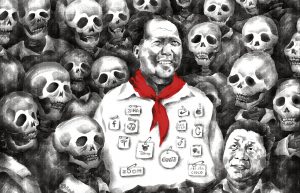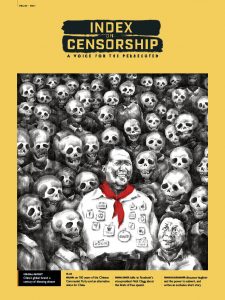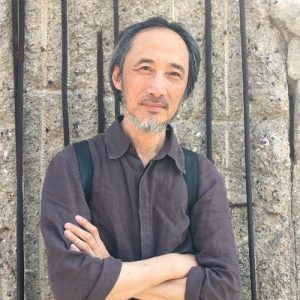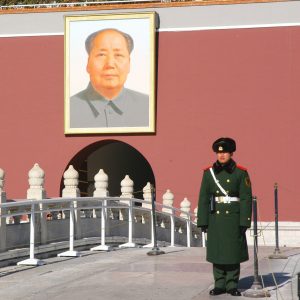China: A century of silencing dissent
Volume 50.01 Spring 2021
Volume 50.01 Spring 2021

Illustration: Badiucao
Index looks back on 100 years of the Chinese Communist Party and how their censorship laws continue to shape the lives of people around the world and threaten their right to free speech. Inside this edition are articles by exiled writer Ma Jian and an interview with Facebook’s vice-president for global affairs, former UK deputy Prime minister Nick Clegg; as well as an exclusive short story from acclaimed writer Shalom Auslander.
Acting editor Martin Bright said: “I am delighted to introduce the latest edition of Index which marks the 100th anniversary of the Chinese Communist Party.”
“This year also marks the 50th anniversary of the magazine and I am proud that we are continuing the founders’ legacy of opposition to totalitarianism.”
“In this Spring edition of Index we are particularly pleased to publish an exclusive essay by the celebrated Chinese writer Ma Jian, who suggests that an alternative tradition of tolerance and freedom is still possible.”
 A century of silencing dissent by Martin Bright: We look at 100 years of the Chinese Communist Party and the methods of control that it has adapted to stifle free expression and spread its ideas throughout the world
A century of silencing dissent by Martin Bright: We look at 100 years of the Chinese Communist Party and the methods of control that it has adapted to stifle free expression and spread its ideas throughout the world
The Index: Free expression round the world today: the inspiring voices, the people who have been imprisoned and the trends, legislation and technology which are causing concern
Fighting back against the menace of Slapps by Jessica Ní Mhainín: Governments continue to threaten journalists with vexatious law suits to stop critical reporting
Friendless Facebook by Sarah Sands: An interview with Facebook vice-president Nick Clegg about being a British liberal at the heart of the US tech giant
Standing up to a global giant by Steven Donziger: A lawyer who has gone head to head with the oil industry since 1993 at great personal cost tells his story
Fear and loathing in Belarus by Yahuen Merkis and Larysa Shchryakova: The crackdown on journalism has continued with arrests. Read the testimony of two reporters
Killed by the truth by Bilal Ahmad Pandow: Babar Qadri was one of Kashmir’s most strident voices, until he was gunned down in his garden
Cartoon by Ben Jennings: Arguments about the removal of statues cause a stir
The martial art of free speech by Ari Deller and Laura Janner-Klausner: The question of Cancel Culture continues to rage. Is it really a problem?

Ma Jian
Burning through censorship: Censorship-busting online organisation GreatFire celebrates its 10th anniversary
The party is your idol by Tianyu M. Fang: China’s propaganda is adapting to target young people
Past imperfect by Rachael Jolley: Four historians explain how the CCP shaped China and ask if globalisation will be its undoing
Turkey changes its tune by Kaya Genç: Uighur refugees living in Turkey find themselves victims of a change in foreign policy
The human face and the boot by Ma Jian: The acclaimed writer-in-exile reflects on 100 years of the CCP and its legacy of bloodshed
A moral hazard by Sally Gimson: Universities around the world and the CCP’s challenges to academic freedom
Director’s cuts by Chris Yeung: Hong Kong broadcaster RTHK has been squeezed by China’s tightening control
Beijing buys Africa’s silence by Issa Sikiti da Silva: Africa’s rich natural resources are being hoovered up by China
A new world order by Natasha Joseph: Journalist Azad Essa found when he wrote about China in Africa, his writing was silenced
A most unlikely ally by Stefan Pozzebon: Paraguay has long been an ally of Taiwan, but it’s paying an economic price
China’s artful dissident: A profile of our cover artist: the exiled cartoonist Badiucao.
Lies, damned lies and fake news by Nick Anstead: Fake news is rife, rampant and harmful. And we can only counter it by making sure that the truth is heard
Censorship? Hardly by Clive Priddle: Even the most controversial book usually finds a publisher after it has been turned down
A voice for the persecuted by Ruth Smeeth: As Index celebrates its 50 year anniversary, we note why free speech is still important

Collective ©ALEXANDER NANAU PRODUCTION
Don’t joke about Jesus by Shalom Auslander: An exclusive short story based on a joke by the acclaimed author of Mother for Dinner
Poet who haunts Ukraine by Steve Komarnyckyj: Vasyl Stus, the writer who remains a Ukrainian hero, 35 years after perishing in a Soviet gulag
The freedom of exile by Khaled Alesmael, Leah Cross: A young refugee Syrian writer on the love between Arab men
Forbidden love songs by Benjamin Lynch: Iran’s underground pop music scene upsets the regime
Reviews: Saudi Arabia’s murder of Jamal Khashoggi, USA Gymnastics and healthcare in Romania: we review three new documentaries
War of the airwaves by Ian Burrell: The Chinese government faces difficulties with its propaganda network CGTN
[vc_row][vc_column width=”1/2″][vc_single_image image=”116569″ img_size=”full”][/vc_column][vc_column width=”1/2″][vc_column_text]Join us for the launch of the new Index on Censorship magazine, China: A century of silencing dissent. In this special edition we are marking the centenary of Chinese Communism with a series of long reads by writers, historians and journalists in the field, including acclaimed writer Ma Jian, whose exclusive personal essay on the legacy of the Chinese Communist Party is a centrepiece of this edition
Ma Jian will open the event with a reading from China Dream, his 2018 dystopian novel about repression and state-enforced amnesia set in contemporary China. The reading will be followed by a conversation with Tania Branigan, The Guardian’s foreign leader writer.
Ma Jian was born in Qingdao, China. He is the author of seven novels, a travel memoir, three story collections and two essay collections. He has been translated into twenty-six languages. Since the publication of his first book in 1987, all his work has been banned in China. He now lives in exile in London.
Tania Branigan is foreign leader writer for The Guardian. She was previously its China correspondent from 2008 to 2015, and before that its political correspondent.[/vc_column_text][/vc_column][/vc_row][vc_row][vc_column][vc_column_text]
[/vc_column_text][/vc_column][/vc_row]
[vc_row][vc_column][vc_column_text]

Photo: PublicDomainPictures
The awful actions of the Chinese government over the last month have dominated our news agenda. The collective actions of the government and their outliers have been designed to silence dissent, to intimidate and to bully.
They have repeatedly attacked core democratic principles both at home and abroad, undermining fair political participation. They’ve arrested democracy activists, changed the law to restrict electoral access to the Hong Kong Legislative Council to sanctioned ‘patriots’ otherwise known as the allies and friends of the Government of China.
The ruling Chinese Communist Party (CCP) has also sanctioned British parliamentarians and activists for daring to speak out about the acts of genocide, happening as I type, in Xinjiang province against the Uighur community. The CCP chose not to target members of the British Government nor key businesses with sanctions.
Instead, it sent a political message and targeted backbench Conservative MPs, two think-tanks and an academic, those who had been most vocal in exposing the actions of the CCP in both Xinjiang and Inner Mongolia. This was a move intended to silence criticism not impose economic sanction, a clumsy and ineffectual effort to restrict free speech outside China’s borders.
This week, these aggressive actions by the CCP culminated with yet another attack on media freedom when the BBC’s lead China correspondent, John Sudworth, was forced to relocate with his family from Beijing to Taiwan after a campaign of state-sanctioned threats and intimidation. Sudworth and his wife, a fellow journalist for the Irish RTE, Yvonne Murray, were faced with no other option than to leave after months of personal attacks in Chinese state media and by Chinese government officials. They will both continue to report on events in China from Taiwan.
The harassment of international journalists in China (and now in Hong Kong) is becoming normalised, with dozens of journalists having to leave in recent months; threats of visas being withheld are now commonplace. This is simply unacceptable.
China seeks to be a loud voice on the global stage – they need to live up to their commitments under the Universal Declaration of Human Rights. They need to remember they are signatories to Article 19 and that media freedom and free expression are protected rights.
Index stands in solidarity with John and Yvonne.[/vc_column_text][/vc_column][/vc_row][vc_row][vc_column][three_column_post title=”You may also want to read” category_id=”41669″][/vc_column][/vc_row]